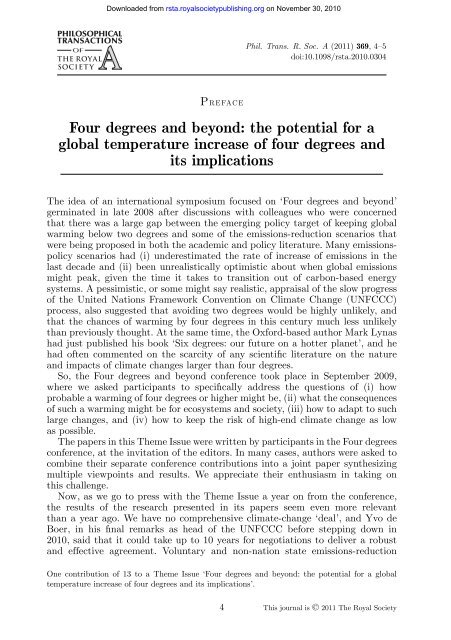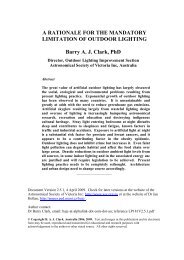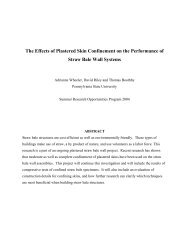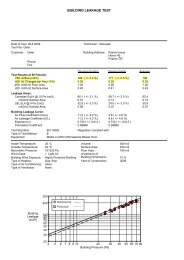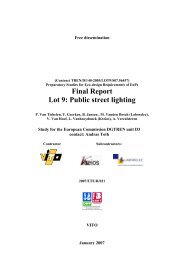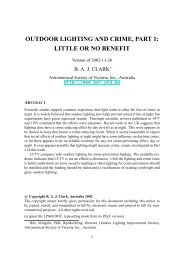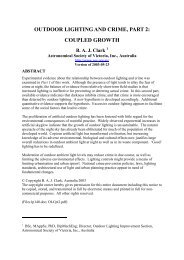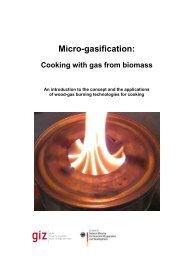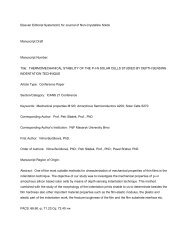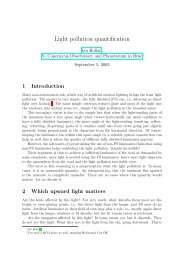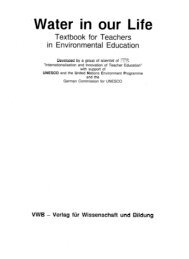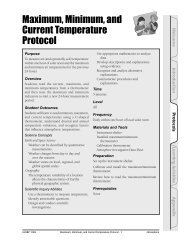Four degrees and beyond: the potential for a global ... - Amper
Four degrees and beyond: the potential for a global ... - Amper
Four degrees and beyond: the potential for a global ... - Amper
You also want an ePaper? Increase the reach of your titles
YUMPU automatically turns print PDFs into web optimized ePapers that Google loves.
Downloaded from<br />
rsta.royalsocietypublishing.org on November 30, 2010<br />
PREFACE<br />
Phil. Trans. R. Soc. A (2011) 369, 4–5<br />
doi:10.1098/rsta.2010.0304<br />
<strong>Four</strong> <strong>degrees</strong> <strong>and</strong> <strong>beyond</strong>: <strong>the</strong> <strong>potential</strong> <strong>for</strong> a<br />
<strong>global</strong> temperature increase of four <strong>degrees</strong> <strong>and</strong><br />
its implications<br />
The idea of an international symposium focused on ‘<strong>Four</strong> <strong>degrees</strong> <strong>and</strong> <strong>beyond</strong>’<br />
germinated in late 2008 after discussions with colleagues who were concerned<br />
that <strong>the</strong>re was a large gap between <strong>the</strong> emerging policy target of keeping <strong>global</strong><br />
warming below two <strong>degrees</strong> <strong>and</strong> some of <strong>the</strong> emissions-reduction scenarios that<br />
were being proposed in both <strong>the</strong> academic <strong>and</strong> policy literature. Many emissionspolicy<br />
scenarios had (i) underestimated <strong>the</strong> rate of increase of emissions in <strong>the</strong><br />
last decade <strong>and</strong> (ii) been unrealistically optimistic about when <strong>global</strong> emissions<br />
might peak, given <strong>the</strong> time it takes to transition out of carbon-based energy<br />
systems. A pessimistic, or some might say realistic, appraisal of <strong>the</strong> slow progress<br />
of <strong>the</strong> United Nations Framework Convention on Climate Change (UNFCCC)<br />
process, also suggested that avoiding two <strong>degrees</strong> would be highly unlikely, <strong>and</strong><br />
that <strong>the</strong> chances of warming by four <strong>degrees</strong> in this century much less unlikely<br />
than previously thought. At <strong>the</strong> same time, <strong>the</strong> Ox<strong>for</strong>d-based author Mark Lynas<br />
had just published his book ‘Six <strong>degrees</strong>: our future on a hotter planet’, <strong>and</strong> he<br />
had often commented on <strong>the</strong> scarcity of any scientific literature on <strong>the</strong> nature<br />
<strong>and</strong> impacts of climate changes larger than four <strong>degrees</strong>.<br />
So, <strong>the</strong> <strong>Four</strong> <strong>degrees</strong> <strong>and</strong> <strong>beyond</strong> conference took place in September 2009,<br />
where we asked participants to specifically address <strong>the</strong> questions of (i) how<br />
probable a warming of four <strong>degrees</strong> or higher might be, (ii) what <strong>the</strong> consequences<br />
of such a warming might be <strong>for</strong> ecosystems <strong>and</strong> society, (iii) how to adapt to such<br />
large changes, <strong>and</strong> (iv) how to keep <strong>the</strong> risk of high-end climate change as low<br />
as possible.<br />
The papers in this Theme Issue were written by participants in <strong>the</strong> <strong>Four</strong> <strong>degrees</strong><br />
conference, at <strong>the</strong> invitation of <strong>the</strong> editors. In many cases, authors were asked to<br />
combine <strong>the</strong>ir separate conference contributions into a joint paper syn<strong>the</strong>sizing<br />
multiple viewpoints <strong>and</strong> results. We appreciate <strong>the</strong>ir enthusiasm in taking on<br />
this challenge.<br />
Now, as we go to press with <strong>the</strong> Theme Issue a year on from <strong>the</strong> conference,<br />
<strong>the</strong> results of <strong>the</strong> research presented in its papers seem even more relevant<br />
than a year ago. We have no comprehensive climate-change ‘deal’, <strong>and</strong> Yvo de<br />
Boer, in his final remarks as head of <strong>the</strong> UNFCCC be<strong>for</strong>e stepping down in<br />
2010, said that it could take up to 10 years <strong>for</strong> negotiations to deliver a robust<br />
<strong>and</strong> effective agreement. Voluntary <strong>and</strong> non-nation state emissions-reduction<br />
One contribution of 13 to a Theme Issue ‘<strong>Four</strong> <strong>degrees</strong> <strong>and</strong> <strong>beyond</strong>: <strong>the</strong> <strong>potential</strong> <strong>for</strong> a <strong>global</strong><br />
temperature increase of four <strong>degrees</strong> <strong>and</strong> its implications’.<br />
4<br />
This journal is © 2011 The Royal Society


